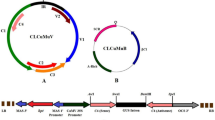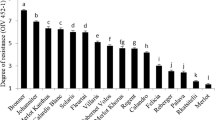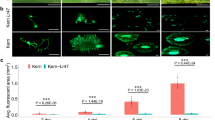Abstract
CURL-STRIPE disease has seriously affected certain plantings of Lilium longiflorum Thunb. in Oregon and California. Control approaches have been uncertain because occurrence patterns and symptomology were equally indicative of nutritional imbalance or virus ætiology and because we had been unable to transmit the disease1. Early-season symptoms, central striping of young leaves due to retardation of plastid formation, followed by curling and twisting of leaves, are striking. Such symptoms may continue or, more usually, later formed foliage may be normal. Bulbs from such plants may or may not produce visibly diseased plants the following year. Such symptom variability is atypical of virus infections of bulb plants.
This is a preview of subscription content, access via your institution
Access options
Subscribe to this journal
Receive 51 print issues and online access
$199.00 per year
only $3.90 per issue
Buy this article
- Purchase on Springer Link
- Instant access to full article PDF
Prices may be subject to local taxes which are calculated during checkout
Similar content being viewed by others
References
McWhorter, F. P., Oregon Ornamental and Nursery Digest, 7, 1 (1960).
Author information
Authors and Affiliations
Rights and permissions
About this article
Cite this article
McWHORTER, F., ALLEN, T. Transfer of Lily Curl Stripe by a Leaf Union Method Applicable to Monocotyledonous Plants. Nature 204, 604–605 (1964). https://doi.org/10.1038/204604b0
Issue Date:
DOI: https://doi.org/10.1038/204604b0
This article is cited by
-
Tobacco rattle virus in lilies
Netherlands Journal of Plant Pathology (1975)
-
Brown ring formation and streak mottle, two distinct syndromes in lilies associated with complex infections of lily symptomless virus and tulip breaking virus
Netherlands Journal of Plant Pathology (1973)
Comments
By submitting a comment you agree to abide by our Terms and Community Guidelines. If you find something abusive or that does not comply with our terms or guidelines please flag it as inappropriate.



